A Comprehensive Research Proposal on Business and Tourism Innovation
VerifiedAdded on 2021/06/16
|21
|3437
|94
Report
AI Summary
This research proposal examines the impact of innovative technologies and business models on the tourism and hospitality industry. It begins with an executive summary, table of contents, and introduction outlining the significance of technological advancements like mobile check-in, online booking, and social media integration in transforming the industry. The proposal defines research aims, objectives, and research questions, focusing on the challenges and opportunities presented by platforms like Airbnb. A literature review explores innovation critics, customer attitudes, and the future of the industry, while the methodology section details the research philosophy, approach, design, data collection processes (including Qualtrics surveys), data analysis techniques, sampling method, and ethical considerations. The proposal also includes a timeline and Gantt chart to outline the project's schedule and concludes with a discussion of research limitations and potential outcomes. The proposal aims to understand how traditional hotels can adapt to the changing landscape and leverage innovations to enhance their services and customer experiences.
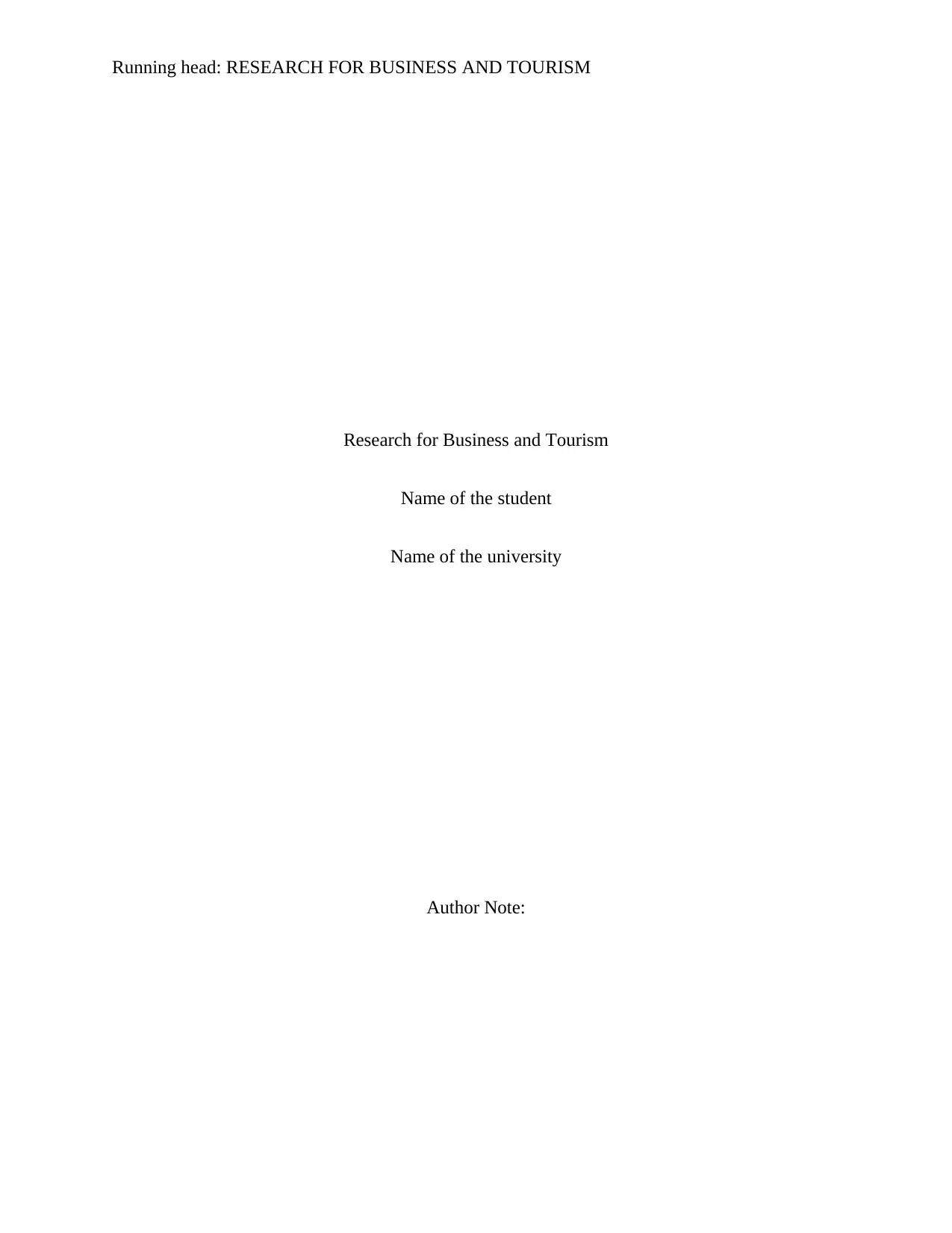
Running head: RESEARCH FOR BUSINESS AND TOURISM
Research for Business and Tourism
Name of the student
Name of the university
Author Note:
Research for Business and Tourism
Name of the student
Name of the university
Author Note:
Paraphrase This Document
Need a fresh take? Get an instant paraphrase of this document with our AI Paraphraser
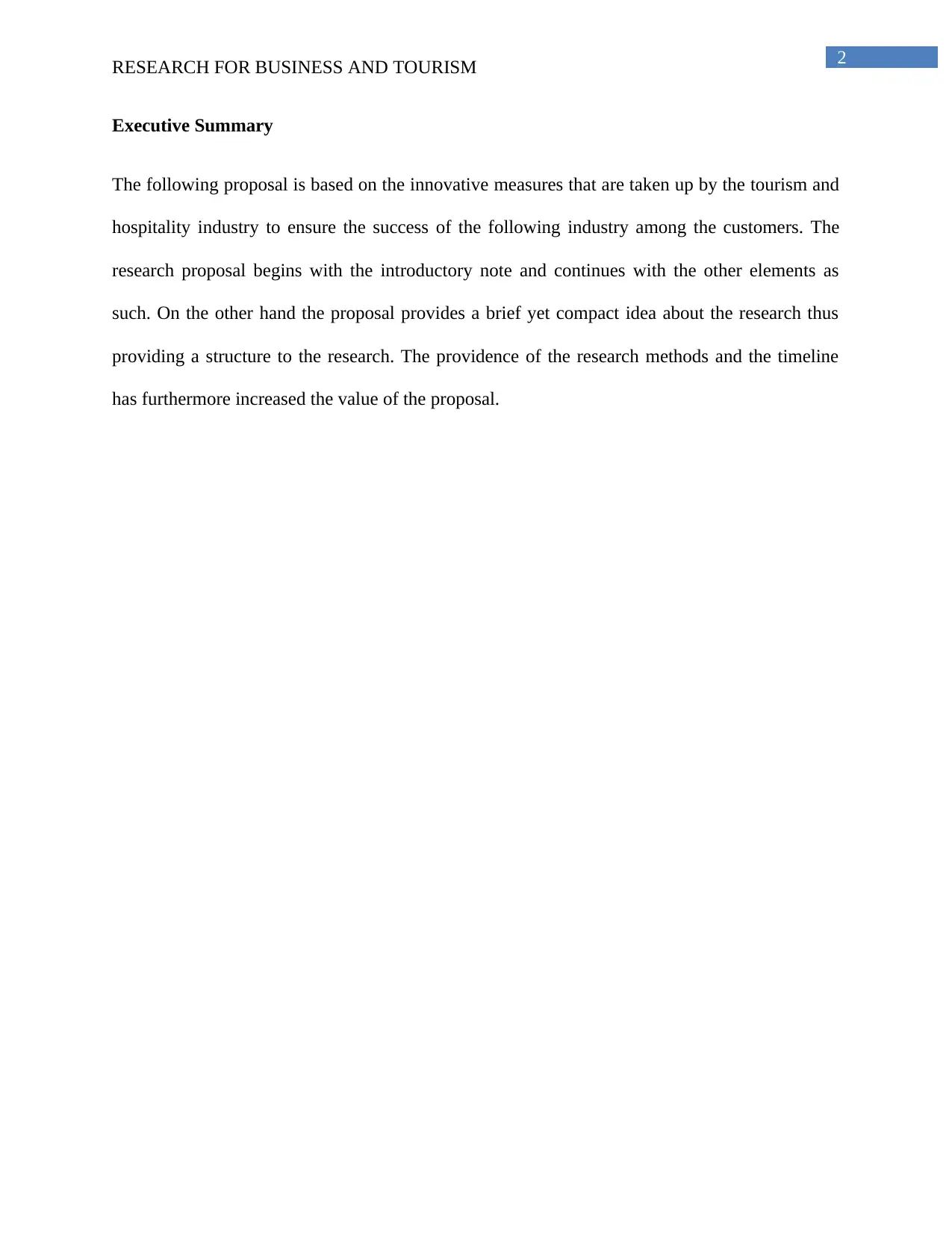
2
RESEARCH FOR BUSINESS AND TOURISM
Executive Summary
The following proposal is based on the innovative measures that are taken up by the tourism and
hospitality industry to ensure the success of the following industry among the customers. The
research proposal begins with the introductory note and continues with the other elements as
such. On the other hand the proposal provides a brief yet compact idea about the research thus
providing a structure to the research. The providence of the research methods and the timeline
has furthermore increased the value of the proposal.
RESEARCH FOR BUSINESS AND TOURISM
Executive Summary
The following proposal is based on the innovative measures that are taken up by the tourism and
hospitality industry to ensure the success of the following industry among the customers. The
research proposal begins with the introductory note and continues with the other elements as
such. On the other hand the proposal provides a brief yet compact idea about the research thus
providing a structure to the research. The providence of the research methods and the timeline
has furthermore increased the value of the proposal.
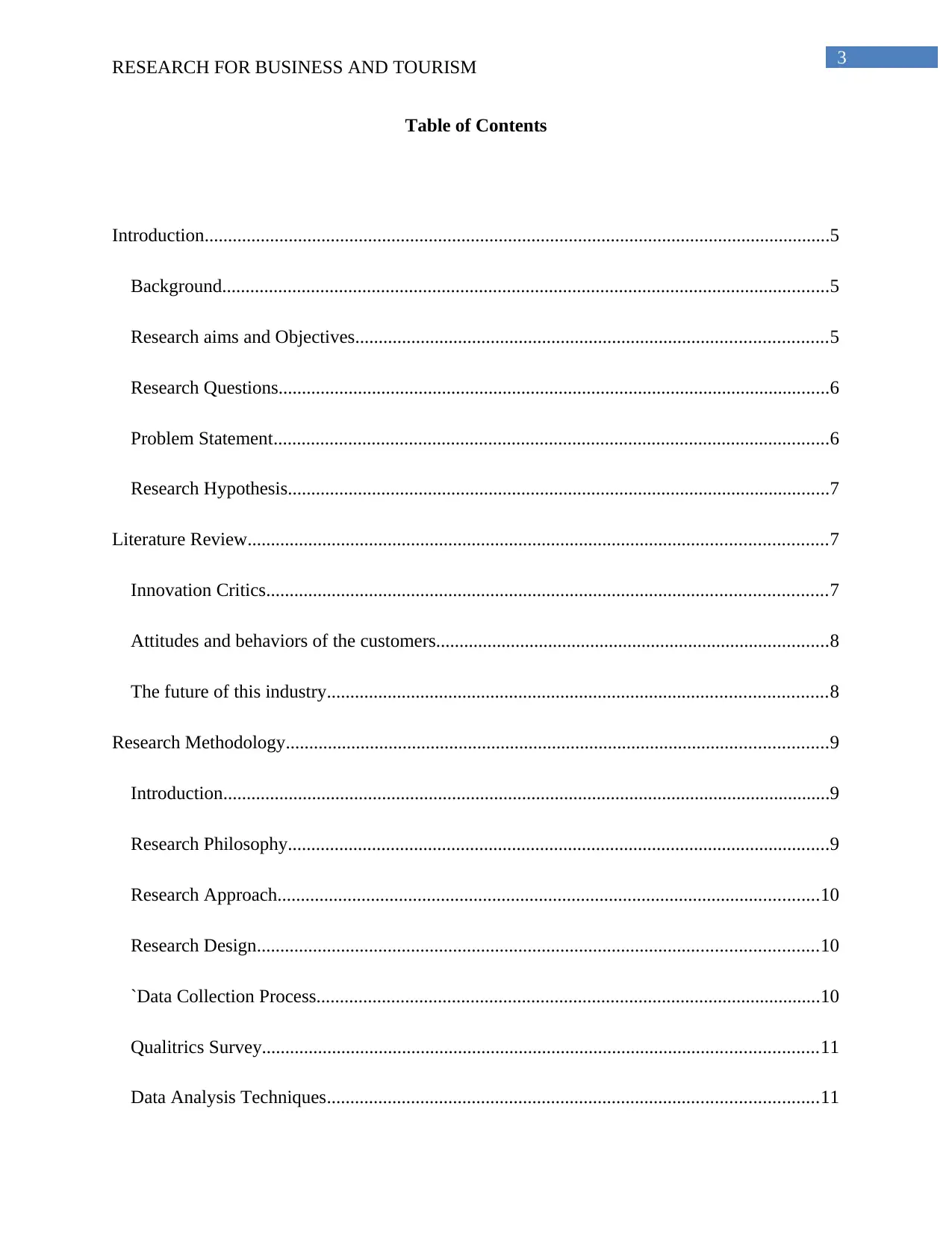
3
RESEARCH FOR BUSINESS AND TOURISM
Table of Contents
Introduction......................................................................................................................................5
Background..................................................................................................................................5
Research aims and Objectives.....................................................................................................5
Research Questions......................................................................................................................6
Problem Statement.......................................................................................................................6
Research Hypothesis....................................................................................................................7
Literature Review............................................................................................................................7
Innovation Critics........................................................................................................................7
Attitudes and behaviors of the customers....................................................................................8
The future of this industry...........................................................................................................8
Research Methodology....................................................................................................................9
Introduction..................................................................................................................................9
Research Philosophy....................................................................................................................9
Research Approach....................................................................................................................10
Research Design........................................................................................................................10
`Data Collection Process............................................................................................................10
Qualitrics Survey.......................................................................................................................11
Data Analysis Techniques.........................................................................................................11
RESEARCH FOR BUSINESS AND TOURISM
Table of Contents
Introduction......................................................................................................................................5
Background..................................................................................................................................5
Research aims and Objectives.....................................................................................................5
Research Questions......................................................................................................................6
Problem Statement.......................................................................................................................6
Research Hypothesis....................................................................................................................7
Literature Review............................................................................................................................7
Innovation Critics........................................................................................................................7
Attitudes and behaviors of the customers....................................................................................8
The future of this industry...........................................................................................................8
Research Methodology....................................................................................................................9
Introduction..................................................................................................................................9
Research Philosophy....................................................................................................................9
Research Approach....................................................................................................................10
Research Design........................................................................................................................10
`Data Collection Process............................................................................................................10
Qualitrics Survey.......................................................................................................................11
Data Analysis Techniques.........................................................................................................11
⊘ This is a preview!⊘
Do you want full access?
Subscribe today to unlock all pages.

Trusted by 1+ million students worldwide
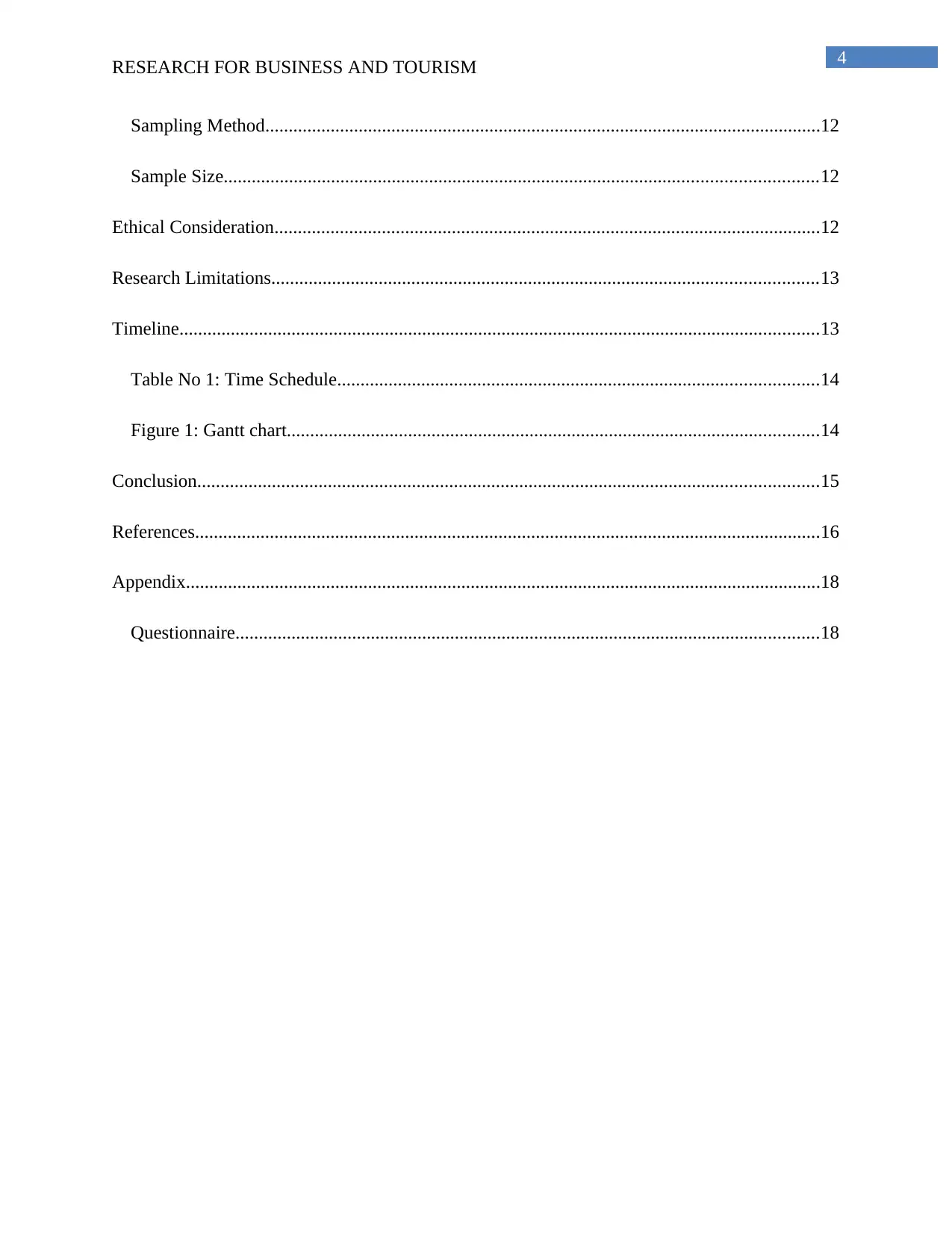
4
RESEARCH FOR BUSINESS AND TOURISM
Sampling Method.......................................................................................................................12
Sample Size...............................................................................................................................12
Ethical Consideration.....................................................................................................................12
Research Limitations.....................................................................................................................13
Timeline.........................................................................................................................................13
Table No 1: Time Schedule.......................................................................................................14
Figure 1: Gantt chart..................................................................................................................14
Conclusion.....................................................................................................................................15
References......................................................................................................................................16
Appendix........................................................................................................................................18
Questionnaire.............................................................................................................................18
RESEARCH FOR BUSINESS AND TOURISM
Sampling Method.......................................................................................................................12
Sample Size...............................................................................................................................12
Ethical Consideration.....................................................................................................................12
Research Limitations.....................................................................................................................13
Timeline.........................................................................................................................................13
Table No 1: Time Schedule.......................................................................................................14
Figure 1: Gantt chart..................................................................................................................14
Conclusion.....................................................................................................................................15
References......................................................................................................................................16
Appendix........................................................................................................................................18
Questionnaire.............................................................................................................................18
Paraphrase This Document
Need a fresh take? Get an instant paraphrase of this document with our AI Paraphraser
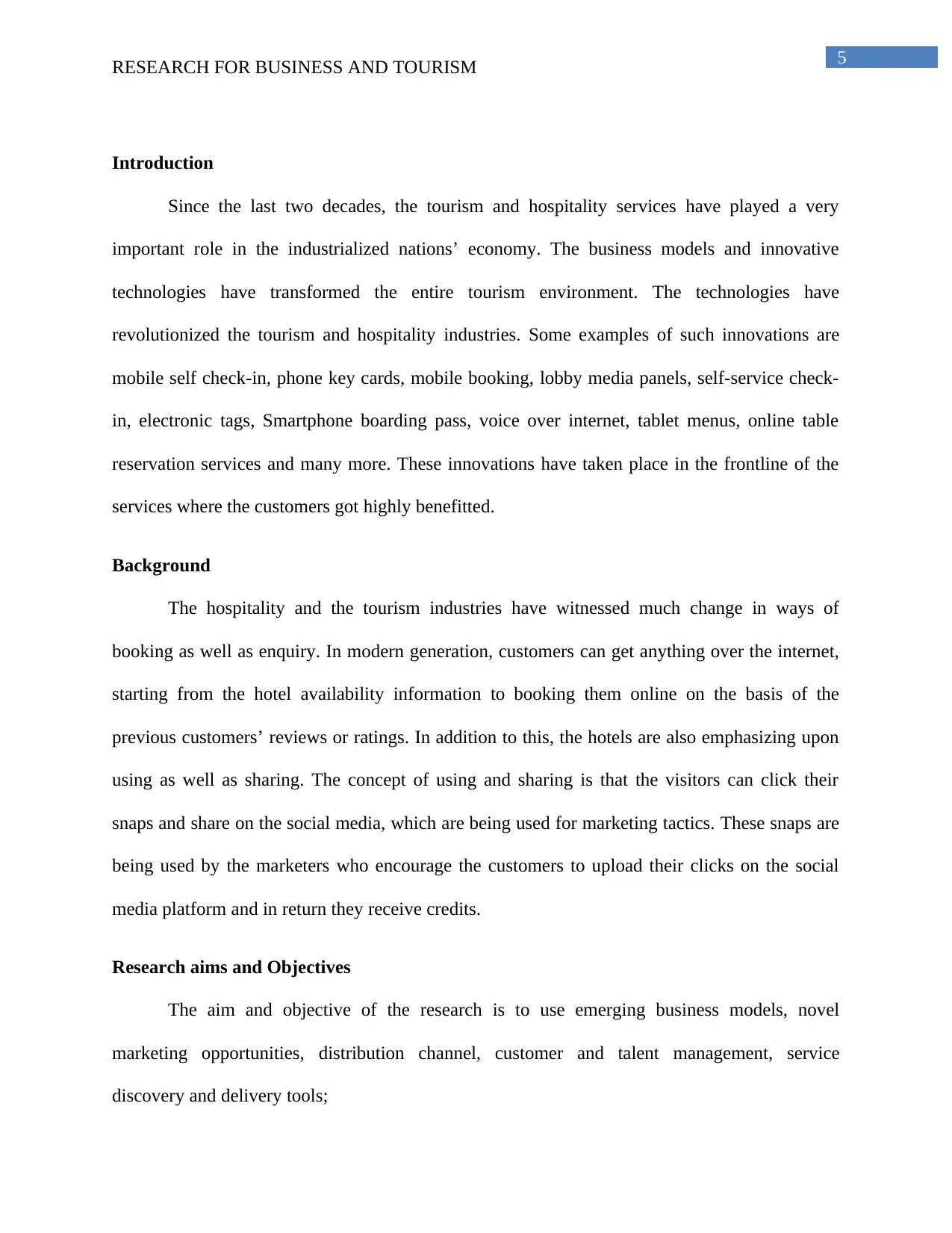
5
RESEARCH FOR BUSINESS AND TOURISM
Introduction
Since the last two decades, the tourism and hospitality services have played a very
important role in the industrialized nations’ economy. The business models and innovative
technologies have transformed the entire tourism environment. The technologies have
revolutionized the tourism and hospitality industries. Some examples of such innovations are
mobile self check-in, phone key cards, mobile booking, lobby media panels, self-service check-
in, electronic tags, Smartphone boarding pass, voice over internet, tablet menus, online table
reservation services and many more. These innovations have taken place in the frontline of the
services where the customers got highly benefitted.
Background
The hospitality and the tourism industries have witnessed much change in ways of
booking as well as enquiry. In modern generation, customers can get anything over the internet,
starting from the hotel availability information to booking them online on the basis of the
previous customers’ reviews or ratings. In addition to this, the hotels are also emphasizing upon
using as well as sharing. The concept of using and sharing is that the visitors can click their
snaps and share on the social media, which are being used for marketing tactics. These snaps are
being used by the marketers who encourage the customers to upload their clicks on the social
media platform and in return they receive credits.
Research aims and Objectives
The aim and objective of the research is to use emerging business models, novel
marketing opportunities, distribution channel, customer and talent management, service
discovery and delivery tools;
RESEARCH FOR BUSINESS AND TOURISM
Introduction
Since the last two decades, the tourism and hospitality services have played a very
important role in the industrialized nations’ economy. The business models and innovative
technologies have transformed the entire tourism environment. The technologies have
revolutionized the tourism and hospitality industries. Some examples of such innovations are
mobile self check-in, phone key cards, mobile booking, lobby media panels, self-service check-
in, electronic tags, Smartphone boarding pass, voice over internet, tablet menus, online table
reservation services and many more. These innovations have taken place in the frontline of the
services where the customers got highly benefitted.
Background
The hospitality and the tourism industries have witnessed much change in ways of
booking as well as enquiry. In modern generation, customers can get anything over the internet,
starting from the hotel availability information to booking them online on the basis of the
previous customers’ reviews or ratings. In addition to this, the hotels are also emphasizing upon
using as well as sharing. The concept of using and sharing is that the visitors can click their
snaps and share on the social media, which are being used for marketing tactics. These snaps are
being used by the marketers who encourage the customers to upload their clicks on the social
media platform and in return they receive credits.
Research aims and Objectives
The aim and objective of the research is to use emerging business models, novel
marketing opportunities, distribution channel, customer and talent management, service
discovery and delivery tools;
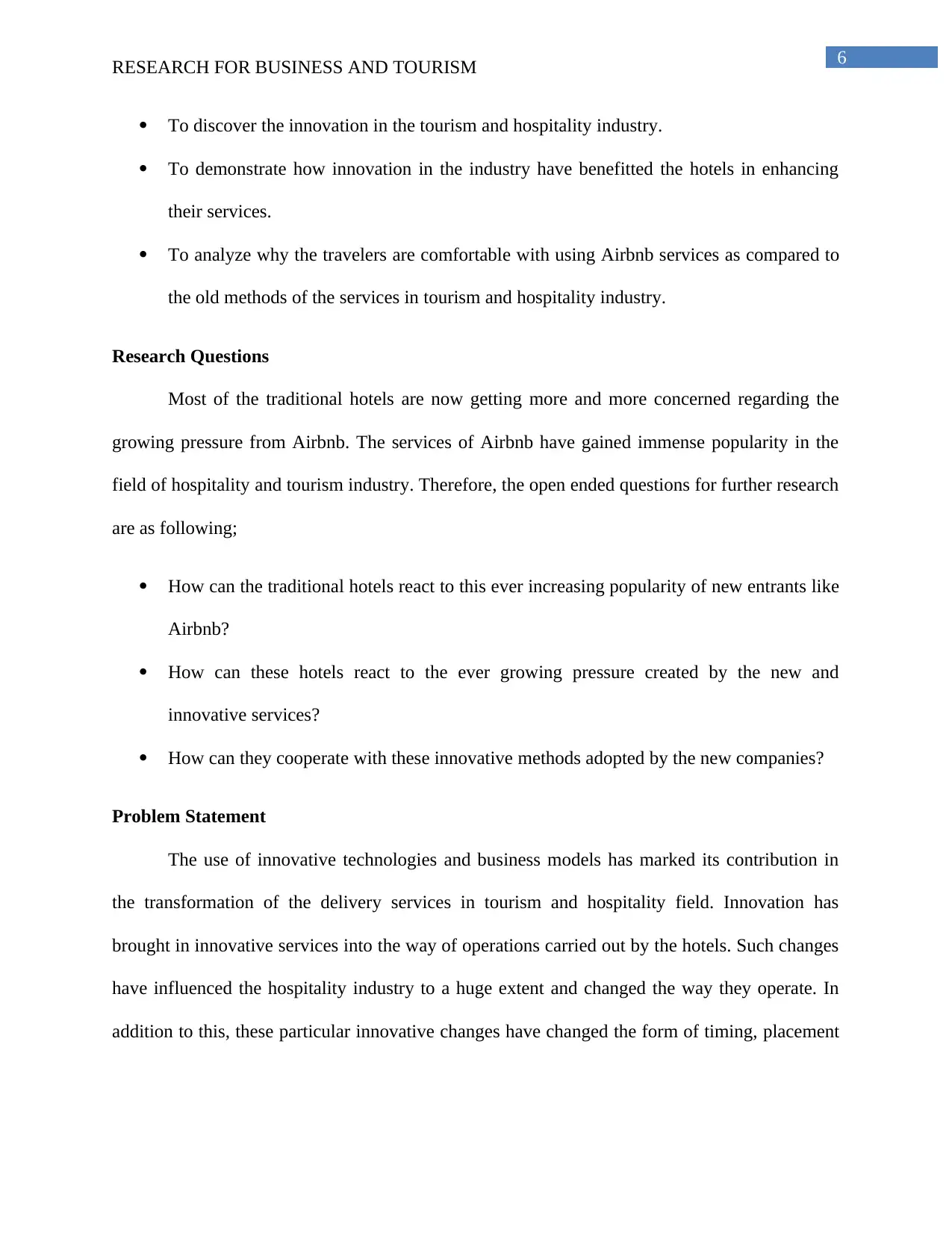
6
RESEARCH FOR BUSINESS AND TOURISM
To discover the innovation in the tourism and hospitality industry.
To demonstrate how innovation in the industry have benefitted the hotels in enhancing
their services.
To analyze why the travelers are comfortable with using Airbnb services as compared to
the old methods of the services in tourism and hospitality industry.
Research Questions
Most of the traditional hotels are now getting more and more concerned regarding the
growing pressure from Airbnb. The services of Airbnb have gained immense popularity in the
field of hospitality and tourism industry. Therefore, the open ended questions for further research
are as following;
How can the traditional hotels react to this ever increasing popularity of new entrants like
Airbnb?
How can these hotels react to the ever growing pressure created by the new and
innovative services?
How can they cooperate with these innovative methods adopted by the new companies?
Problem Statement
The use of innovative technologies and business models has marked its contribution in
the transformation of the delivery services in tourism and hospitality field. Innovation has
brought in innovative services into the way of operations carried out by the hotels. Such changes
have influenced the hospitality industry to a huge extent and changed the way they operate. In
addition to this, these particular innovative changes have changed the form of timing, placement
RESEARCH FOR BUSINESS AND TOURISM
To discover the innovation in the tourism and hospitality industry.
To demonstrate how innovation in the industry have benefitted the hotels in enhancing
their services.
To analyze why the travelers are comfortable with using Airbnb services as compared to
the old methods of the services in tourism and hospitality industry.
Research Questions
Most of the traditional hotels are now getting more and more concerned regarding the
growing pressure from Airbnb. The services of Airbnb have gained immense popularity in the
field of hospitality and tourism industry. Therefore, the open ended questions for further research
are as following;
How can the traditional hotels react to this ever increasing popularity of new entrants like
Airbnb?
How can these hotels react to the ever growing pressure created by the new and
innovative services?
How can they cooperate with these innovative methods adopted by the new companies?
Problem Statement
The use of innovative technologies and business models has marked its contribution in
the transformation of the delivery services in tourism and hospitality field. Innovation has
brought in innovative services into the way of operations carried out by the hotels. Such changes
have influenced the hospitality industry to a huge extent and changed the way they operate. In
addition to this, these particular innovative changes have changed the form of timing, placement
⊘ This is a preview!⊘
Do you want full access?
Subscribe today to unlock all pages.

Trusted by 1+ million students worldwide
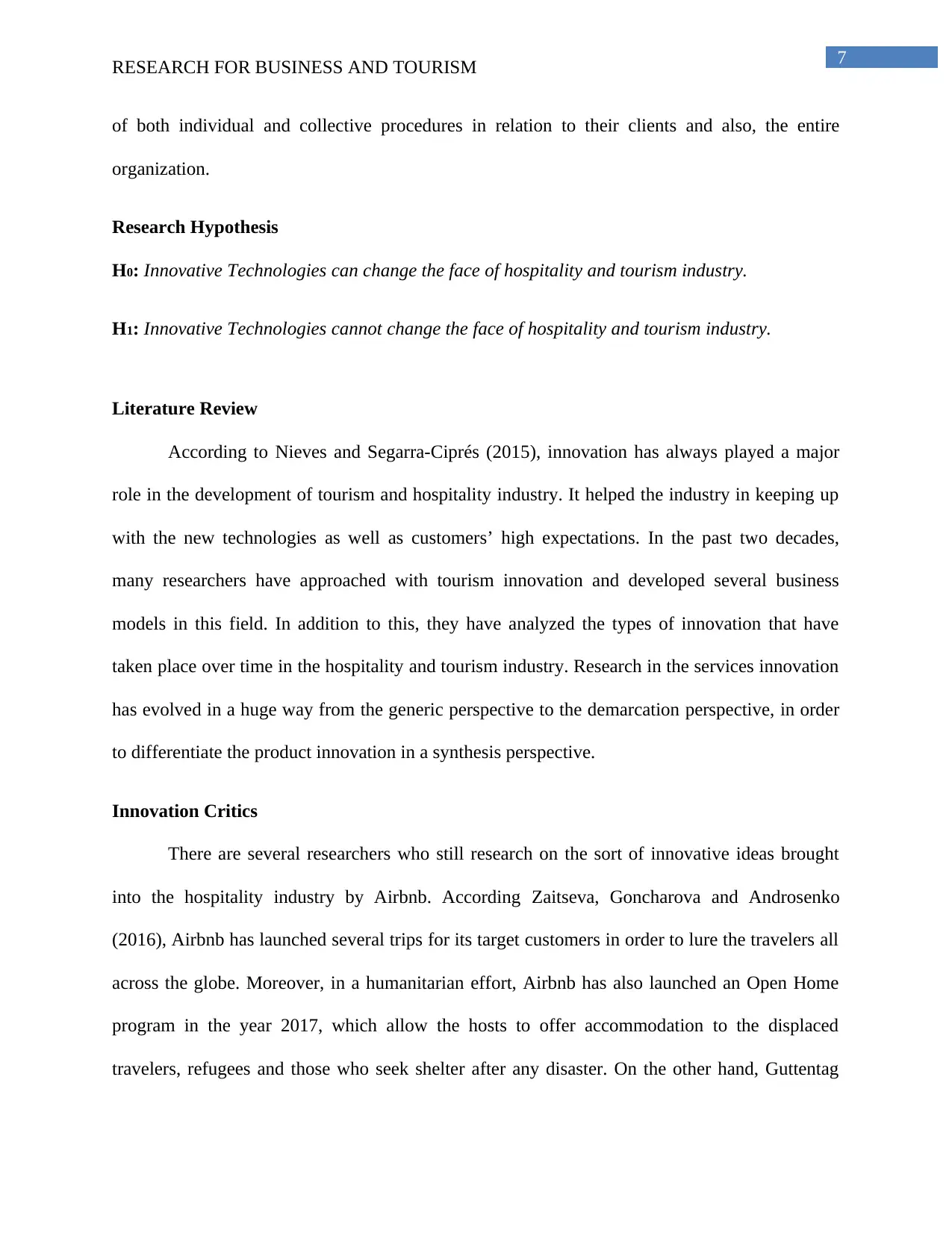
7
RESEARCH FOR BUSINESS AND TOURISM
of both individual and collective procedures in relation to their clients and also, the entire
organization.
Research Hypothesis
H0: Innovative Technologies can change the face of hospitality and tourism industry.
H1: Innovative Technologies cannot change the face of hospitality and tourism industry.
Literature Review
According to Nieves and Segarra-Ciprés (2015), innovation has always played a major
role in the development of tourism and hospitality industry. It helped the industry in keeping up
with the new technologies as well as customers’ high expectations. In the past two decades,
many researchers have approached with tourism innovation and developed several business
models in this field. In addition to this, they have analyzed the types of innovation that have
taken place over time in the hospitality and tourism industry. Research in the services innovation
has evolved in a huge way from the generic perspective to the demarcation perspective, in order
to differentiate the product innovation in a synthesis perspective.
Innovation Critics
There are several researchers who still research on the sort of innovative ideas brought
into the hospitality industry by Airbnb. According Zaitseva, Goncharova and Androsenko
(2016), Airbnb has launched several trips for its target customers in order to lure the travelers all
across the globe. Moreover, in a humanitarian effort, Airbnb has also launched an Open Home
program in the year 2017, which allow the hosts to offer accommodation to the displaced
travelers, refugees and those who seek shelter after any disaster. On the other hand, Guttentag
RESEARCH FOR BUSINESS AND TOURISM
of both individual and collective procedures in relation to their clients and also, the entire
organization.
Research Hypothesis
H0: Innovative Technologies can change the face of hospitality and tourism industry.
H1: Innovative Technologies cannot change the face of hospitality and tourism industry.
Literature Review
According to Nieves and Segarra-Ciprés (2015), innovation has always played a major
role in the development of tourism and hospitality industry. It helped the industry in keeping up
with the new technologies as well as customers’ high expectations. In the past two decades,
many researchers have approached with tourism innovation and developed several business
models in this field. In addition to this, they have analyzed the types of innovation that have
taken place over time in the hospitality and tourism industry. Research in the services innovation
has evolved in a huge way from the generic perspective to the demarcation perspective, in order
to differentiate the product innovation in a synthesis perspective.
Innovation Critics
There are several researchers who still research on the sort of innovative ideas brought
into the hospitality industry by Airbnb. According Zaitseva, Goncharova and Androsenko
(2016), Airbnb has launched several trips for its target customers in order to lure the travelers all
across the globe. Moreover, in a humanitarian effort, Airbnb has also launched an Open Home
program in the year 2017, which allow the hosts to offer accommodation to the displaced
travelers, refugees and those who seek shelter after any disaster. On the other hand, Guttentag
Paraphrase This Document
Need a fresh take? Get an instant paraphrase of this document with our AI Paraphraser
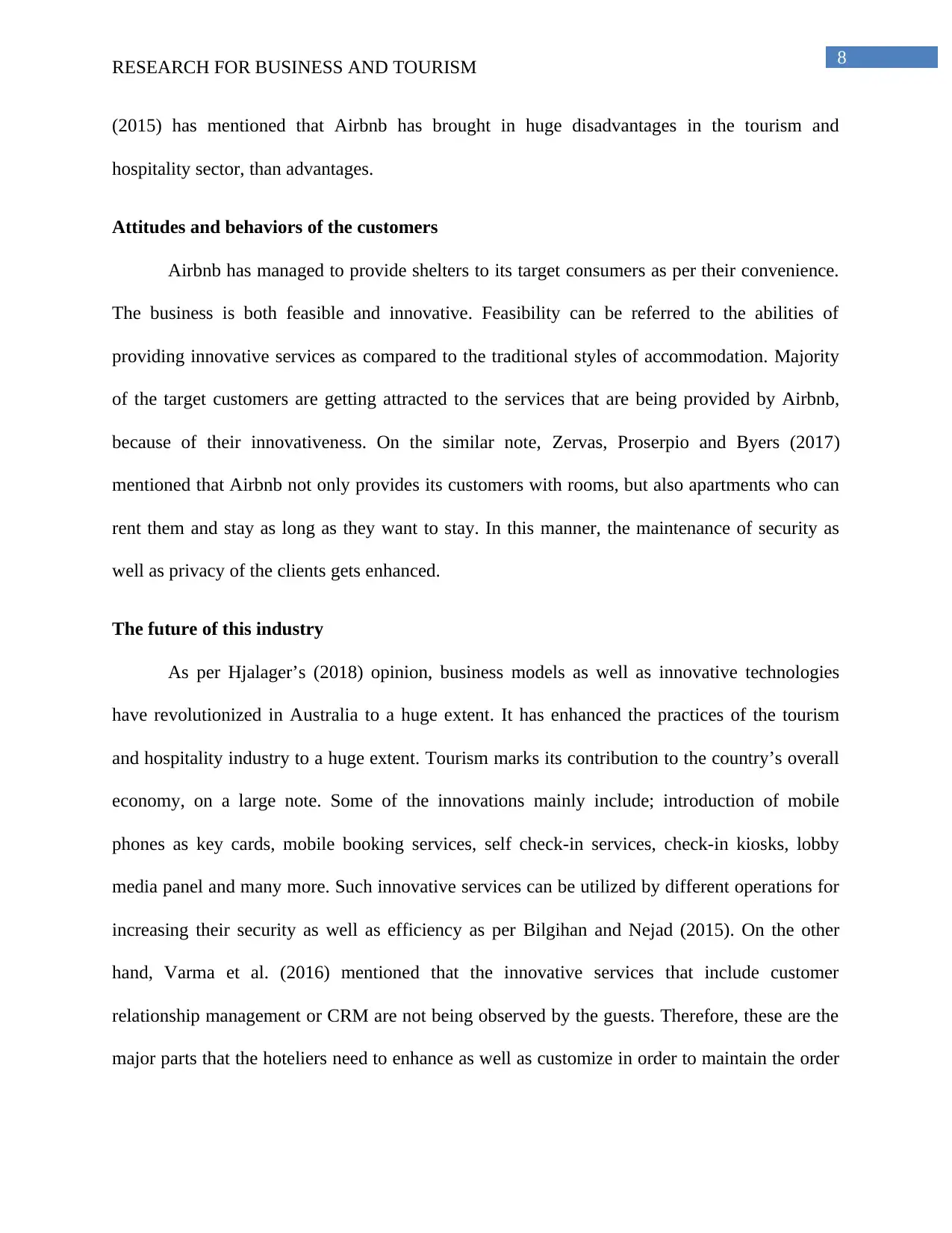
8
RESEARCH FOR BUSINESS AND TOURISM
(2015) has mentioned that Airbnb has brought in huge disadvantages in the tourism and
hospitality sector, than advantages.
Attitudes and behaviors of the customers
Airbnb has managed to provide shelters to its target consumers as per their convenience.
The business is both feasible and innovative. Feasibility can be referred to the abilities of
providing innovative services as compared to the traditional styles of accommodation. Majority
of the target customers are getting attracted to the services that are being provided by Airbnb,
because of their innovativeness. On the similar note, Zervas, Proserpio and Byers (2017)
mentioned that Airbnb not only provides its customers with rooms, but also apartments who can
rent them and stay as long as they want to stay. In this manner, the maintenance of security as
well as privacy of the clients gets enhanced.
The future of this industry
As per Hjalager’s (2018) opinion, business models as well as innovative technologies
have revolutionized in Australia to a huge extent. It has enhanced the practices of the tourism
and hospitality industry to a huge extent. Tourism marks its contribution to the country’s overall
economy, on a large note. Some of the innovations mainly include; introduction of mobile
phones as key cards, mobile booking services, self check-in services, check-in kiosks, lobby
media panel and many more. Such innovative services can be utilized by different operations for
increasing their security as well as efficiency as per Bilgihan and Nejad (2015). On the other
hand, Varma et al. (2016) mentioned that the innovative services that include customer
relationship management or CRM are not being observed by the guests. Therefore, these are the
major parts that the hoteliers need to enhance as well as customize in order to maintain the order
RESEARCH FOR BUSINESS AND TOURISM
(2015) has mentioned that Airbnb has brought in huge disadvantages in the tourism and
hospitality sector, than advantages.
Attitudes and behaviors of the customers
Airbnb has managed to provide shelters to its target consumers as per their convenience.
The business is both feasible and innovative. Feasibility can be referred to the abilities of
providing innovative services as compared to the traditional styles of accommodation. Majority
of the target customers are getting attracted to the services that are being provided by Airbnb,
because of their innovativeness. On the similar note, Zervas, Proserpio and Byers (2017)
mentioned that Airbnb not only provides its customers with rooms, but also apartments who can
rent them and stay as long as they want to stay. In this manner, the maintenance of security as
well as privacy of the clients gets enhanced.
The future of this industry
As per Hjalager’s (2018) opinion, business models as well as innovative technologies
have revolutionized in Australia to a huge extent. It has enhanced the practices of the tourism
and hospitality industry to a huge extent. Tourism marks its contribution to the country’s overall
economy, on a large note. Some of the innovations mainly include; introduction of mobile
phones as key cards, mobile booking services, self check-in services, check-in kiosks, lobby
media panel and many more. Such innovative services can be utilized by different operations for
increasing their security as well as efficiency as per Bilgihan and Nejad (2015). On the other
hand, Varma et al. (2016) mentioned that the innovative services that include customer
relationship management or CRM are not being observed by the guests. Therefore, these are the
major parts that the hoteliers need to enhance as well as customize in order to maintain the order
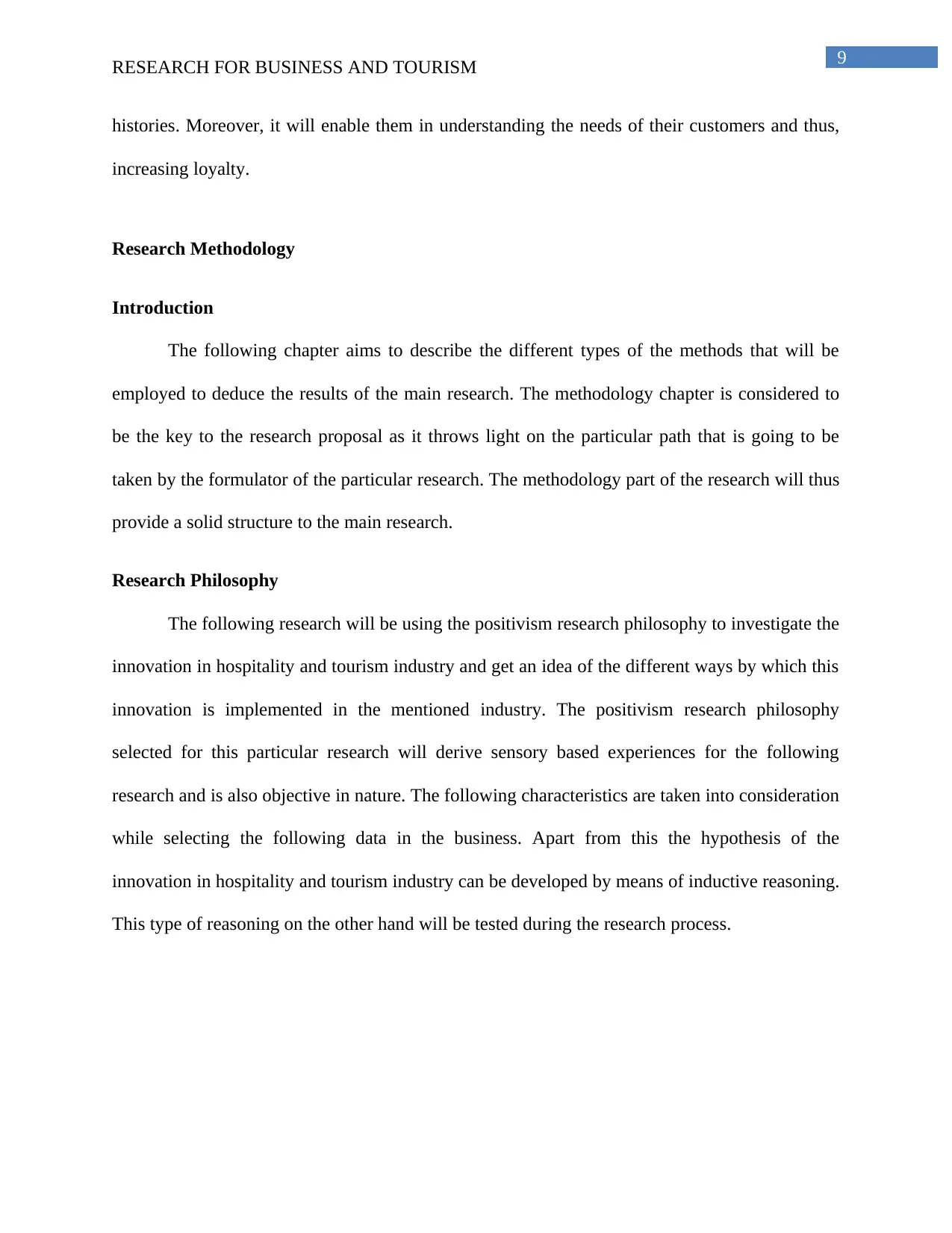
9
RESEARCH FOR BUSINESS AND TOURISM
histories. Moreover, it will enable them in understanding the needs of their customers and thus,
increasing loyalty.
Research Methodology
Introduction
The following chapter aims to describe the different types of the methods that will be
employed to deduce the results of the main research. The methodology chapter is considered to
be the key to the research proposal as it throws light on the particular path that is going to be
taken by the formulator of the particular research. The methodology part of the research will thus
provide a solid structure to the main research.
Research Philosophy
The following research will be using the positivism research philosophy to investigate the
innovation in hospitality and tourism industry and get an idea of the different ways by which this
innovation is implemented in the mentioned industry. The positivism research philosophy
selected for this particular research will derive sensory based experiences for the following
research and is also objective in nature. The following characteristics are taken into consideration
while selecting the following data in the business. Apart from this the hypothesis of the
innovation in hospitality and tourism industry can be developed by means of inductive reasoning.
This type of reasoning on the other hand will be tested during the research process.
RESEARCH FOR BUSINESS AND TOURISM
histories. Moreover, it will enable them in understanding the needs of their customers and thus,
increasing loyalty.
Research Methodology
Introduction
The following chapter aims to describe the different types of the methods that will be
employed to deduce the results of the main research. The methodology chapter is considered to
be the key to the research proposal as it throws light on the particular path that is going to be
taken by the formulator of the particular research. The methodology part of the research will thus
provide a solid structure to the main research.
Research Philosophy
The following research will be using the positivism research philosophy to investigate the
innovation in hospitality and tourism industry and get an idea of the different ways by which this
innovation is implemented in the mentioned industry. The positivism research philosophy
selected for this particular research will derive sensory based experiences for the following
research and is also objective in nature. The following characteristics are taken into consideration
while selecting the following data in the business. Apart from this the hypothesis of the
innovation in hospitality and tourism industry can be developed by means of inductive reasoning.
This type of reasoning on the other hand will be tested during the research process.
⊘ This is a preview!⊘
Do you want full access?
Subscribe today to unlock all pages.

Trusted by 1+ million students worldwide
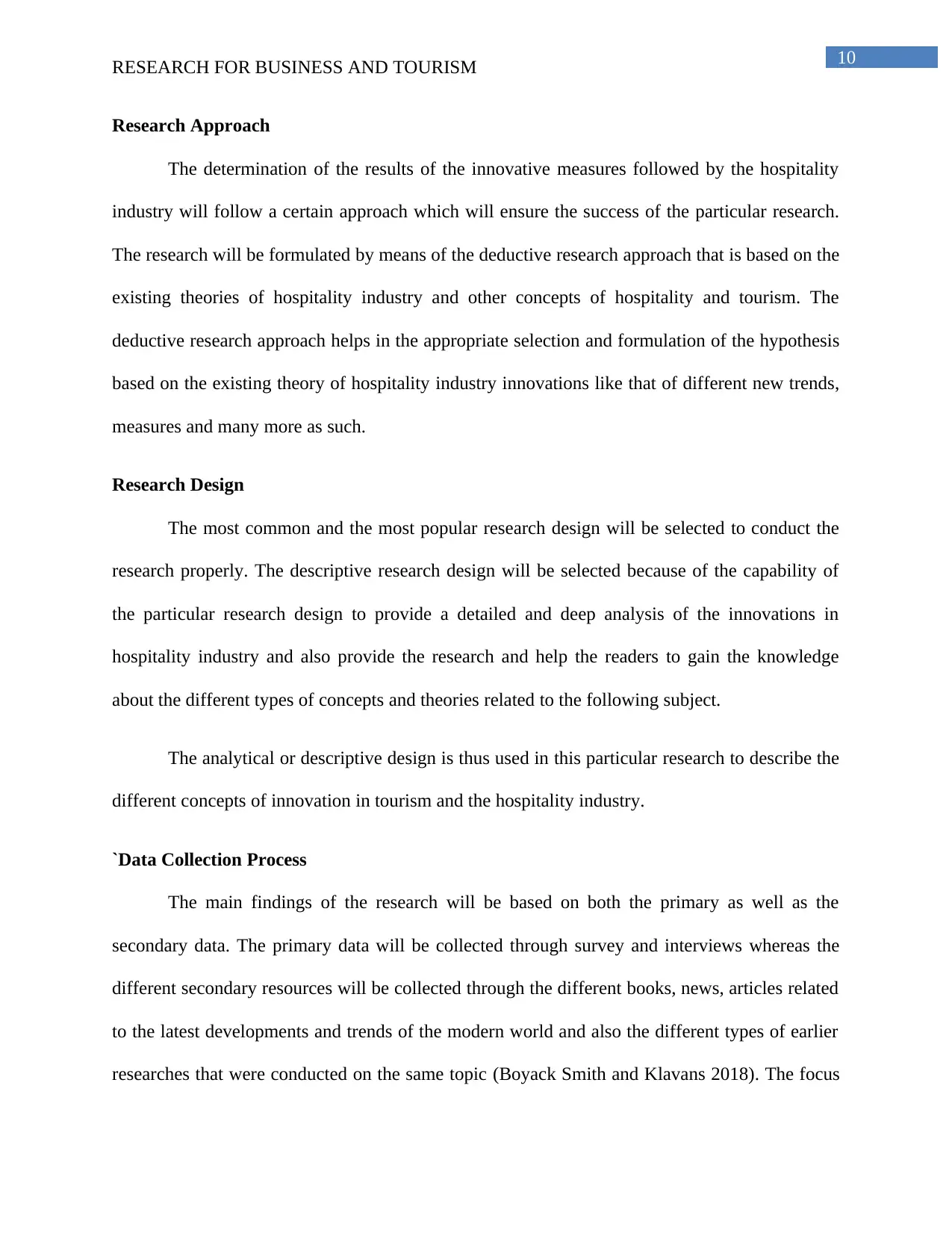
10
RESEARCH FOR BUSINESS AND TOURISM
Research Approach
The determination of the results of the innovative measures followed by the hospitality
industry will follow a certain approach which will ensure the success of the particular research.
The research will be formulated by means of the deductive research approach that is based on the
existing theories of hospitality industry and other concepts of hospitality and tourism. The
deductive research approach helps in the appropriate selection and formulation of the hypothesis
based on the existing theory of hospitality industry innovations like that of different new trends,
measures and many more as such.
Research Design
The most common and the most popular research design will be selected to conduct the
research properly. The descriptive research design will be selected because of the capability of
the particular research design to provide a detailed and deep analysis of the innovations in
hospitality industry and also provide the research and help the readers to gain the knowledge
about the different types of concepts and theories related to the following subject.
The analytical or descriptive design is thus used in this particular research to describe the
different concepts of innovation in tourism and the hospitality industry.
`Data Collection Process
The main findings of the research will be based on both the primary as well as the
secondary data. The primary data will be collected through survey and interviews whereas the
different secondary resources will be collected through the different books, news, articles related
to the latest developments and trends of the modern world and also the different types of earlier
researches that were conducted on the same topic (Boyack Smith and Klavans 2018). The focus
RESEARCH FOR BUSINESS AND TOURISM
Research Approach
The determination of the results of the innovative measures followed by the hospitality
industry will follow a certain approach which will ensure the success of the particular research.
The research will be formulated by means of the deductive research approach that is based on the
existing theories of hospitality industry and other concepts of hospitality and tourism. The
deductive research approach helps in the appropriate selection and formulation of the hypothesis
based on the existing theory of hospitality industry innovations like that of different new trends,
measures and many more as such.
Research Design
The most common and the most popular research design will be selected to conduct the
research properly. The descriptive research design will be selected because of the capability of
the particular research design to provide a detailed and deep analysis of the innovations in
hospitality industry and also provide the research and help the readers to gain the knowledge
about the different types of concepts and theories related to the following subject.
The analytical or descriptive design is thus used in this particular research to describe the
different concepts of innovation in tourism and the hospitality industry.
`Data Collection Process
The main findings of the research will be based on both the primary as well as the
secondary data. The primary data will be collected through survey and interviews whereas the
different secondary resources will be collected through the different books, news, articles related
to the latest developments and trends of the modern world and also the different types of earlier
researches that were conducted on the same topic (Boyack Smith and Klavans 2018). The focus
Paraphrase This Document
Need a fresh take? Get an instant paraphrase of this document with our AI Paraphraser
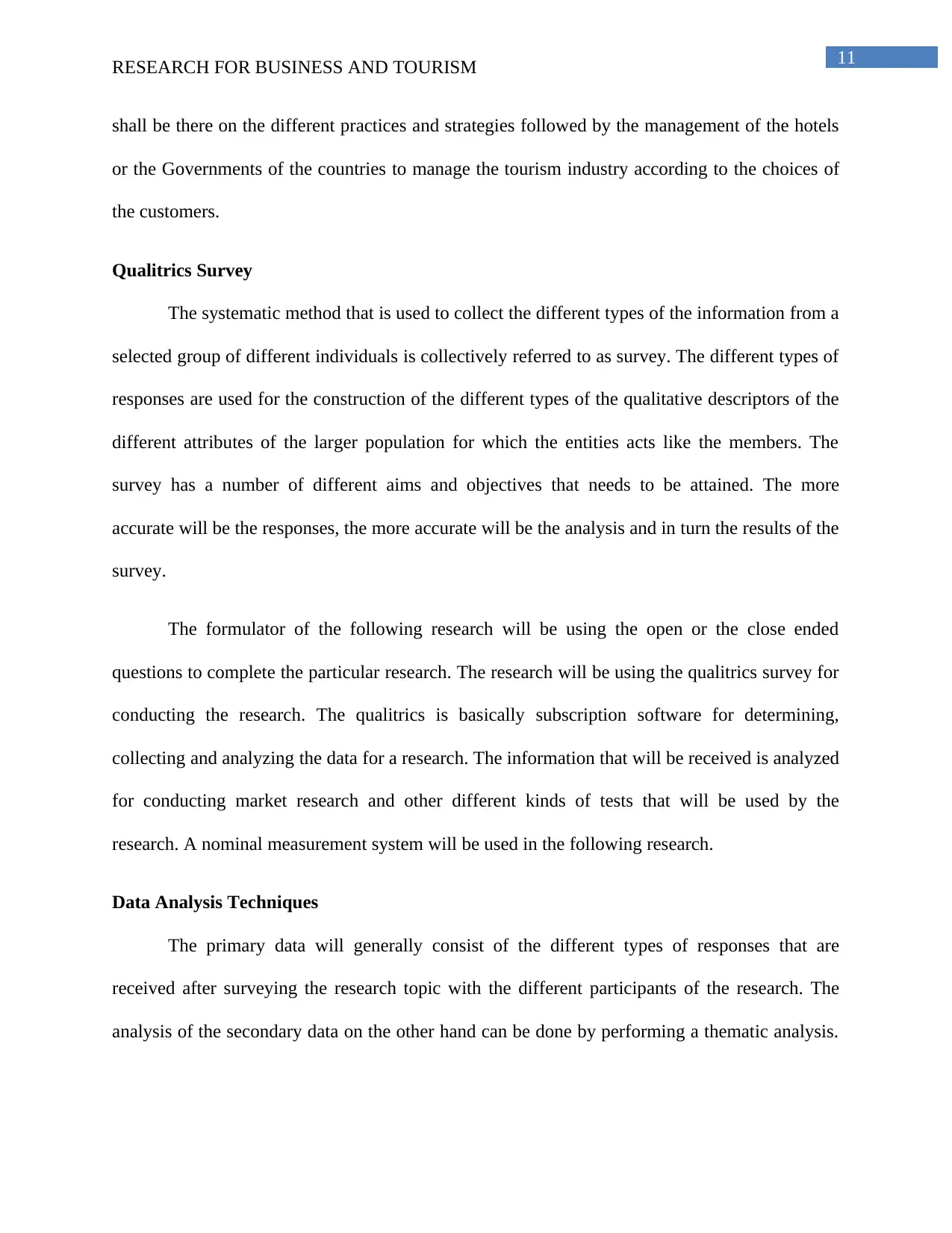
11
RESEARCH FOR BUSINESS AND TOURISM
shall be there on the different practices and strategies followed by the management of the hotels
or the Governments of the countries to manage the tourism industry according to the choices of
the customers.
Qualitrics Survey
The systematic method that is used to collect the different types of the information from a
selected group of different individuals is collectively referred to as survey. The different types of
responses are used for the construction of the different types of the qualitative descriptors of the
different attributes of the larger population for which the entities acts like the members. The
survey has a number of different aims and objectives that needs to be attained. The more
accurate will be the responses, the more accurate will be the analysis and in turn the results of the
survey.
The formulator of the following research will be using the open or the close ended
questions to complete the particular research. The research will be using the qualitrics survey for
conducting the research. The qualitrics is basically subscription software for determining,
collecting and analyzing the data for a research. The information that will be received is analyzed
for conducting market research and other different kinds of tests that will be used by the
research. A nominal measurement system will be used in the following research.
Data Analysis Techniques
The primary data will generally consist of the different types of responses that are
received after surveying the research topic with the different participants of the research. The
analysis of the secondary data on the other hand can be done by performing a thematic analysis.
RESEARCH FOR BUSINESS AND TOURISM
shall be there on the different practices and strategies followed by the management of the hotels
or the Governments of the countries to manage the tourism industry according to the choices of
the customers.
Qualitrics Survey
The systematic method that is used to collect the different types of the information from a
selected group of different individuals is collectively referred to as survey. The different types of
responses are used for the construction of the different types of the qualitative descriptors of the
different attributes of the larger population for which the entities acts like the members. The
survey has a number of different aims and objectives that needs to be attained. The more
accurate will be the responses, the more accurate will be the analysis and in turn the results of the
survey.
The formulator of the following research will be using the open or the close ended
questions to complete the particular research. The research will be using the qualitrics survey for
conducting the research. The qualitrics is basically subscription software for determining,
collecting and analyzing the data for a research. The information that will be received is analyzed
for conducting market research and other different kinds of tests that will be used by the
research. A nominal measurement system will be used in the following research.
Data Analysis Techniques
The primary data will generally consist of the different types of responses that are
received after surveying the research topic with the different participants of the research. The
analysis of the secondary data on the other hand can be done by performing a thematic analysis.
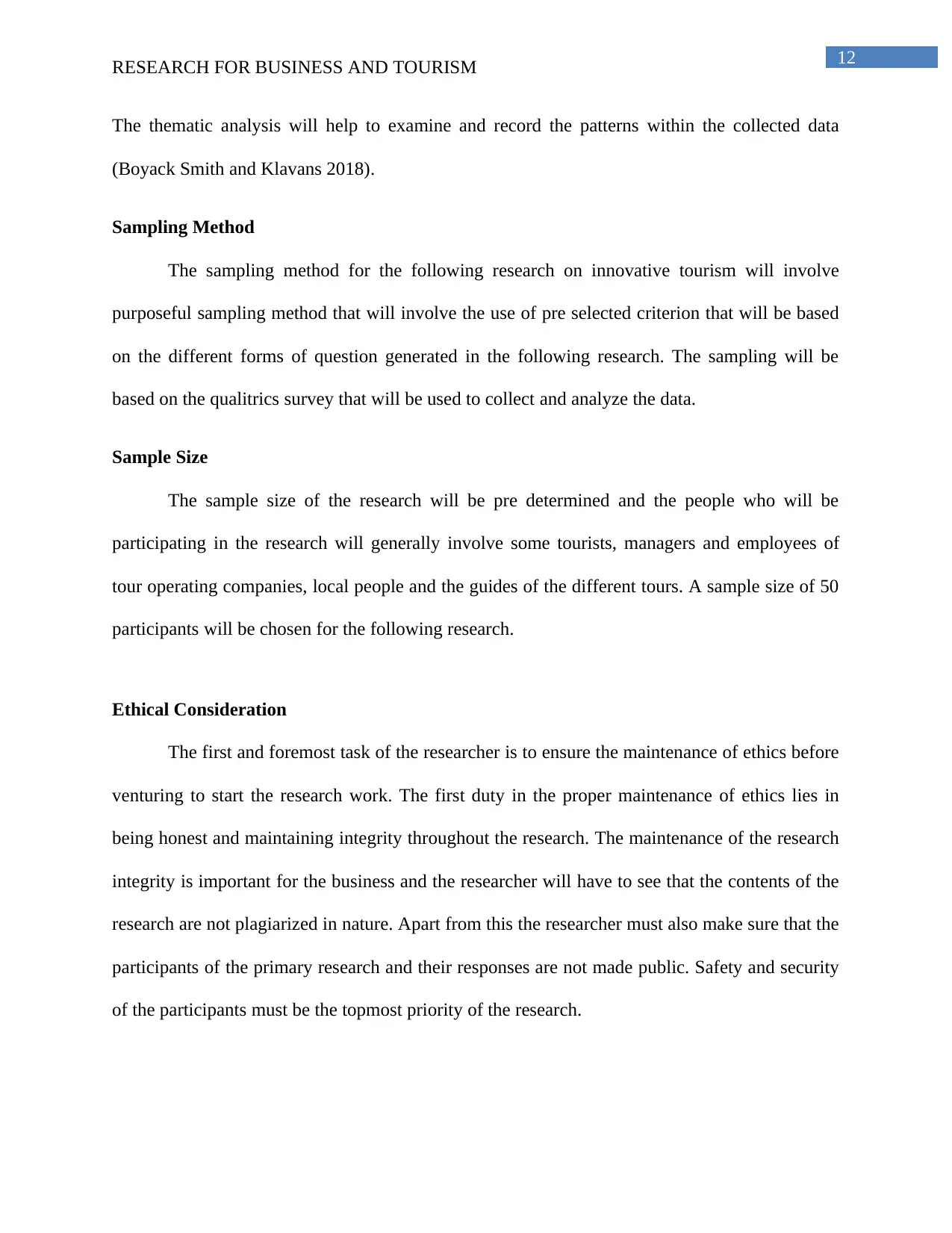
12
RESEARCH FOR BUSINESS AND TOURISM
The thematic analysis will help to examine and record the patterns within the collected data
(Boyack Smith and Klavans 2018).
Sampling Method
The sampling method for the following research on innovative tourism will involve
purposeful sampling method that will involve the use of pre selected criterion that will be based
on the different forms of question generated in the following research. The sampling will be
based on the qualitrics survey that will be used to collect and analyze the data.
Sample Size
The sample size of the research will be pre determined and the people who will be
participating in the research will generally involve some tourists, managers and employees of
tour operating companies, local people and the guides of the different tours. A sample size of 50
participants will be chosen for the following research.
Ethical Consideration
The first and foremost task of the researcher is to ensure the maintenance of ethics before
venturing to start the research work. The first duty in the proper maintenance of ethics lies in
being honest and maintaining integrity throughout the research. The maintenance of the research
integrity is important for the business and the researcher will have to see that the contents of the
research are not plagiarized in nature. Apart from this the researcher must also make sure that the
participants of the primary research and their responses are not made public. Safety and security
of the participants must be the topmost priority of the research.
RESEARCH FOR BUSINESS AND TOURISM
The thematic analysis will help to examine and record the patterns within the collected data
(Boyack Smith and Klavans 2018).
Sampling Method
The sampling method for the following research on innovative tourism will involve
purposeful sampling method that will involve the use of pre selected criterion that will be based
on the different forms of question generated in the following research. The sampling will be
based on the qualitrics survey that will be used to collect and analyze the data.
Sample Size
The sample size of the research will be pre determined and the people who will be
participating in the research will generally involve some tourists, managers and employees of
tour operating companies, local people and the guides of the different tours. A sample size of 50
participants will be chosen for the following research.
Ethical Consideration
The first and foremost task of the researcher is to ensure the maintenance of ethics before
venturing to start the research work. The first duty in the proper maintenance of ethics lies in
being honest and maintaining integrity throughout the research. The maintenance of the research
integrity is important for the business and the researcher will have to see that the contents of the
research are not plagiarized in nature. Apart from this the researcher must also make sure that the
participants of the primary research and their responses are not made public. Safety and security
of the participants must be the topmost priority of the research.
⊘ This is a preview!⊘
Do you want full access?
Subscribe today to unlock all pages.

Trusted by 1+ million students worldwide
1 out of 21
Related Documents
Your All-in-One AI-Powered Toolkit for Academic Success.
+13062052269
info@desklib.com
Available 24*7 on WhatsApp / Email
![[object Object]](/_next/static/media/star-bottom.7253800d.svg)
Unlock your academic potential
Copyright © 2020–2026 A2Z Services. All Rights Reserved. Developed and managed by ZUCOL.





